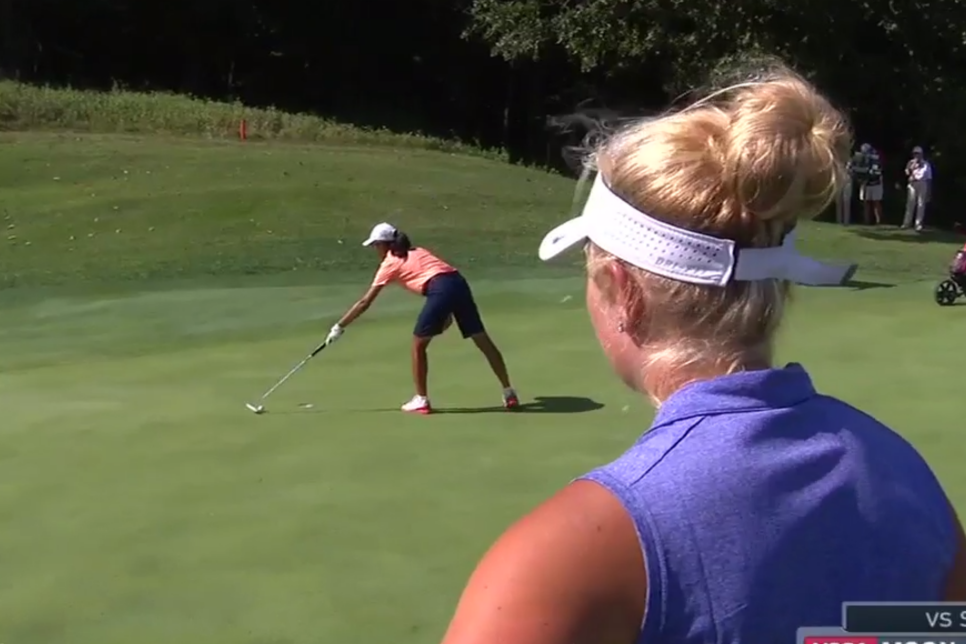News
When it comes to the Rules of Golf, ‘intent’ has become an unfortunate dog-whistle for ‘honesty’

A new season of “Curb Your Enthusiasm” debuts in October. But if you’re eager for golf versions of the famous Larry David Stare—that probing, suspicious, lean-in gaze that attempts to reveal if one is really telling the truth—there has been a lot of that going on with the rules lately. As evidenced in the high-profile cases of Jon Rahm, Lexi Thompson, Bernhard Langer and two teenagers at the U.S. Girls’ Junior Championship, there is a strong cultural trend of not just questioning players’ actions, but often their motives.
The operative words in all cases are “intent” or “intentional,” which increasingly are being filtered to have more malevolent meanings than they once did. Rules violations are being tossed about in the court of public opinion much differently than in the past. Where “intent” once meant a tracing of a player’s physical actions in rules situations—what he had in mind when, say, scooting into a bush to take a swing—it now is expressed as a desire to uncover moral turpitude, a dog whistle for honesty. When Rahm mismarked his ball at the Irish Open and Thompson did something similar at the ANA Inspiration, their delay in addressing sparked some to allege some greater mischief. And with Langer, there is an undercurrent of suspicion that he’s anchoring—and knows it.
It’s a strange and troubling shift. The result in the Thompson case was her breaking down while addressing the episode almost three weeks later, stating at one point, “That [mismarking] was not my intention.” Would a news conference have been called if the violation were more innocuous—say, finding 15 clubs in her bag? Doubtful. It was the nature of it, the way her mismark—and Rahm’s—were caught on TV and replayed through the news cycles. It wasn’t hidden-camera stuff, but the presentation had a way of appearing furtive, of their being “caught in the act.” It takes so little to light a fire under the public these days. (Perhaps, too, that’s why Rahm’s subsequent dust up at the British Open regarding the movement of a questioned loose impediment, with its lack of video to arbitrate the issue, became less audacious, save for the fact that it involved Rahm again.)
• • •
Variations of “intent” have long been present in The Rules of Golf and in the decisions book, and they do address dishonesty. A player in match play intentionally giving his opponent wrong information comes to mind. Far more often, however, “intent” connotes more to fact than general intention. If I’m an official and you’re the player, and you tell me you were just trying to get a solid stance when you pushed sand back into that footprint you created in a bunker, I tell you I understand your intention, but that it’s a violation of Rule 13-3. Next case!
The rules actually provide for all of this stuff. There’s been so little actual change in the way the rules feature “intent” now compared to even a few years ago. The anchoring rule (Rule 14-1b, note), which brings intent into play, is the one really notable exception. It’s surprising the USGA and R&A wrote it the way they did, without realizing the lashing out that might occur in his case.
The Langer case is particularly compelling. In the midst of another dominating season (four wins, bringing his career senior total to a whopping 33), he hasn’t altered his putting technique a whit, save for freeing his left hand and forearm from his torso, as the rules require. This has been a source of deep annoyance to purists who hoped that the ban would eliminate use of the long putter altogether. There are those who feel his hand still adheres to his chest, and, through accusation and innuendo, have sought their pound of flesh. Langer, never a firebrand type, was pushed to finally say that some his accusers were “jealous.” True that, but I don’t think he understands the public desire to find rules hanky-panky. A deeply religious man, he seems to have trouble comprehending that people would presume the worst of him. But nothing short of wearing body paint rather than a shirt—material proof that there is no hand-body contact—is likely to quell the accusations.
As for Rahm and Thompson, it’s doubtful there would be this level of furor if it happened a few years ago. To date, one “intent” controversy stays in my memory: Tom Watson accusing Gary Player of moving a growing leaf from behind his ball during the 1983 Skins Game. Watson said he did, Player said he didn’t, and the dustup lingered. Who knows what Player’s intent was as he stooped over his ball? It was a very rare case.

Jeff Gross
But this is 2017. The worst “intent” reactions have occurred mainly on Twitter and other social media, scores if not hundreds of people questioning the purity of Rahm’s, Thompson’s and Langer’s intent. All the worst accusatory terms came into play as these incidents churned through the Twitter washing machine. “Deliberate,” “On purpose” and “Trying to gain an advantage” vaguely come to mind. Even the positive comments were unsavory, in a damning-with-faint-praise kind of way. Things like, “He probably deserves a pass.” “I kind of doubt she cheated.” They left behind the notion that we need to keep an eye on these players, to keep them honest.
We know that social media is influential. But it’s mattering in layers deeper than what we’ve known. Taking the trolls out of the equation, there are countless people who gain their knowledge, form their opinions and perpetuate notions to others through those mediums. With a subject like The Rules of Golf and its complex set of tenets and principles, it spells trouble that is hard to correct. The Twitter and Facebook commenters are vital part of golf’s base. They may be new or infrequent segments and not highly educated, but they account for huge numbers of TV viewers—and hopefully, players. The most unsettling aspect of the recent episodes was the sense that the base isn’t emerging better-educated, or with a more shining view of the game or its players at the top level.
• • •
A few theories. One, the commenters often are either anonymous or so obscure that they don’t care. Trolls. Another is that new or uninformed golfers who watch golf only in passing—the “fan factory,” as Jackie Burke puts it—see high-level golfers as harboring the same ethos as athletes from other sports. Meaning, you get away with whatever you can. This ties closely to another theory, one bred into our culture by unseemly behavior by politicians, financiers and celebrities. They see people as being inherently evil rather than good.
Last, and perhaps most significant, fans are using the “intent” word as a blowback against the rules, which they see as punitive and unfair. The comments on Langer, Rahm and Thompson were accusatory, but in the case of Erica Shepherd and Elizabeth Moon at the recent U.S. Girls’ Junior Championship, “intent” was employed as a {misguided demand to let one of the players off the hook](https://www.golfdigest.com/story/us-girls-junior-semifinal-ends-with-controversial-tap-in-putt).

To review, Moon missed a three-footer to win on the 19th hole of her semifinal match against Shepherd. She quickly and impulsively raked the tap-in that was left back, to putt again. Shepherd’s coach and caddie asked Shepherd if she’d conceded the putt. “I didn’t say that was good,” Shepherd replied. The penalty that resulted (Rule 18-2 for moving a ball at rest) cost Moon the hole and the match. The real trouble started when Shepherd stated in the aftermath that, given time, she would have conceded the putt. Her intent, leveled post-facto, unleashed a torrent of unfortunate opinion on Twitter. Some felt that since Shepherd intended to give the putt, that the match should have been allowed to continue. Others attacked Shepherd—“She should not agree to win in this way!”—was a typical reaction. This was impossible for Shepherd to do, as Rule 2-4 states that a concession can’t be offered after the fact. Also, it was a rules official, not Shepherd, who levied the penalty on Moon.
The final ironic aspect is that dialing up “intent,” the very thing I’m decrying at the tip-top competitive levels, happens all the time at the club level. The guy who drops his club and has it hit his ball during a friendly $2 nassau, is from my experience forgiven more often than not, for the sheer lack of intent. Tournaments no, weekend games yes.
But the truth is, that’s a different world. We all can make a habit of supposing the worst of our fellows and levying penalties if we like, but breathing that high-minded air practically assures that we will wind up breathing it—and playing—alone. It’s best to keep the Larry David Stares under wraps and hope that, like Erica Shepherd, we had our eyes closed when the fatal moment occurs.

